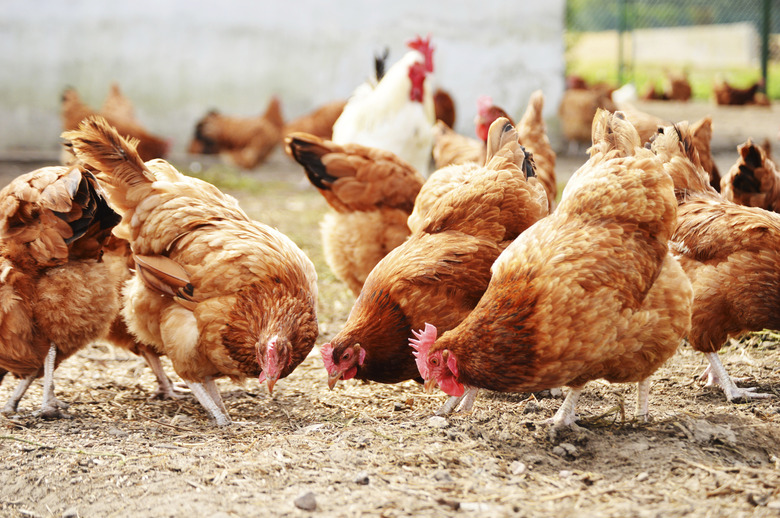How To Use Chicken Manure As Garden Fertilizer
Chicken manure introduces more nutrients into the soil than other types, such as steer manure. While this fertilizer might not beat chemical fertilizers in the nitrogen-phosphorous-potassium rating, it gives your soil something those fertilizers don't: structure. It serves as a soil amendment as well as plant food, improving drainage in dense soils and water-retention abilities in loamy soils. Fresh manure brings dangers for you and your plants, however, so to use chicken manure, start with properly composted or aged versions in the spring and fall.
Killing Pathogens
Like all fresh manure, untreated chicken manure carries bacteria and pathogens that can infect humans. These don't harm plants, but they remain in the soil for up to a year, ready to tag along on your hands as you work in the garden or on your vegetables that touch the soil — a reason to always wear gloves when you work with manure. To reduce the chances of contamination, use chicken manure that was composted with high heat — at least 131 degrees Fahrenheit — for at least 15 days. Alternatively, choose manure that has aged for at least a year. Always wash vegetables grown in chicken manure before eating them.
The bacteria might not hurt the plants, but fresh manure is potent enough to burn plant roots, killing them. Composting or aging the manure solves this problem as well.
Compatible Plants
The nutrients from chicken manure tend to work well with edible gardens, including fruits, leafy vegetables and root vegetables. The pH varies depending on many factors, including the chicken's age and food, but chicken manure leans toward alkaline with a pH range of 6.5 to 8.0. It isn't compatible with acid-loving plants such as azaleas (Rhododendron), which grow in U.S. Department of Agriculture plant hardiness zones 4 through 9.
Application Times
Your garden benefits from applications of chicken manure during two seasons. Applying the fertilizer in the fall helps the soil absorb and break down the nutrients so they're readily available when you're ready to plant in the spring. Using the chicken manure in the spring gives a quick boost of nitrogen to the plants, helping them start off strong.
How Much to Use
Chicken manure's NPK ratio varies, usually ranging from 3-2.5-1.5 to 6-4-3; by comparison, steer manure typically provides a ratio of 1-1-1. To get these nutrients to your plants effectively, apply 125 pounds of composted or aged chicken manure per 1,000 square feet of your garden. It takes about 450 pounds of steer manure to provide similar nutrients to the same area.
References
- Sunset: A Crash Course in Fertilizers
- Royal Horticultural Society: Chicken Manure
- Washington State University King County Extension: Using Manure, Including Chicken Manure, as Compost
- Old Farmer's Almanac: Manure Guide
- Certified Organic Associations of British Columbia: Poultry Litter Composting for Food Safety & Soil Nutrient Management
- Old Farmer's Almanac: Rhododendrons
- North Carolina State University: Nutrient Content of Manures
